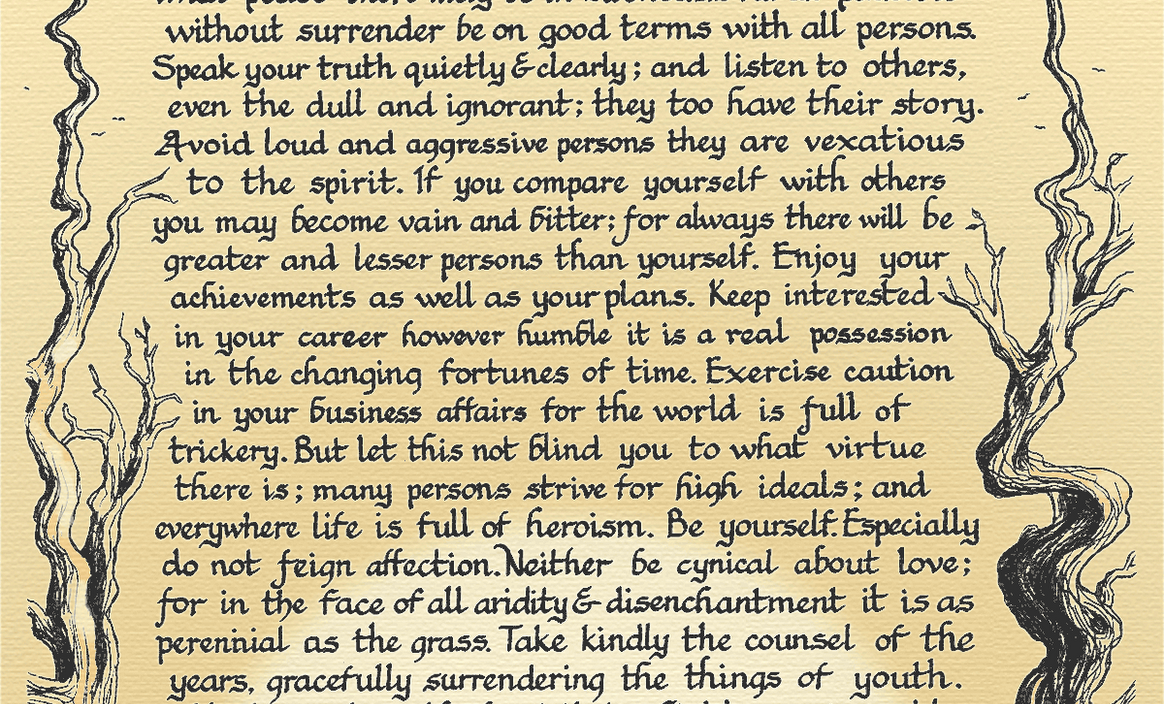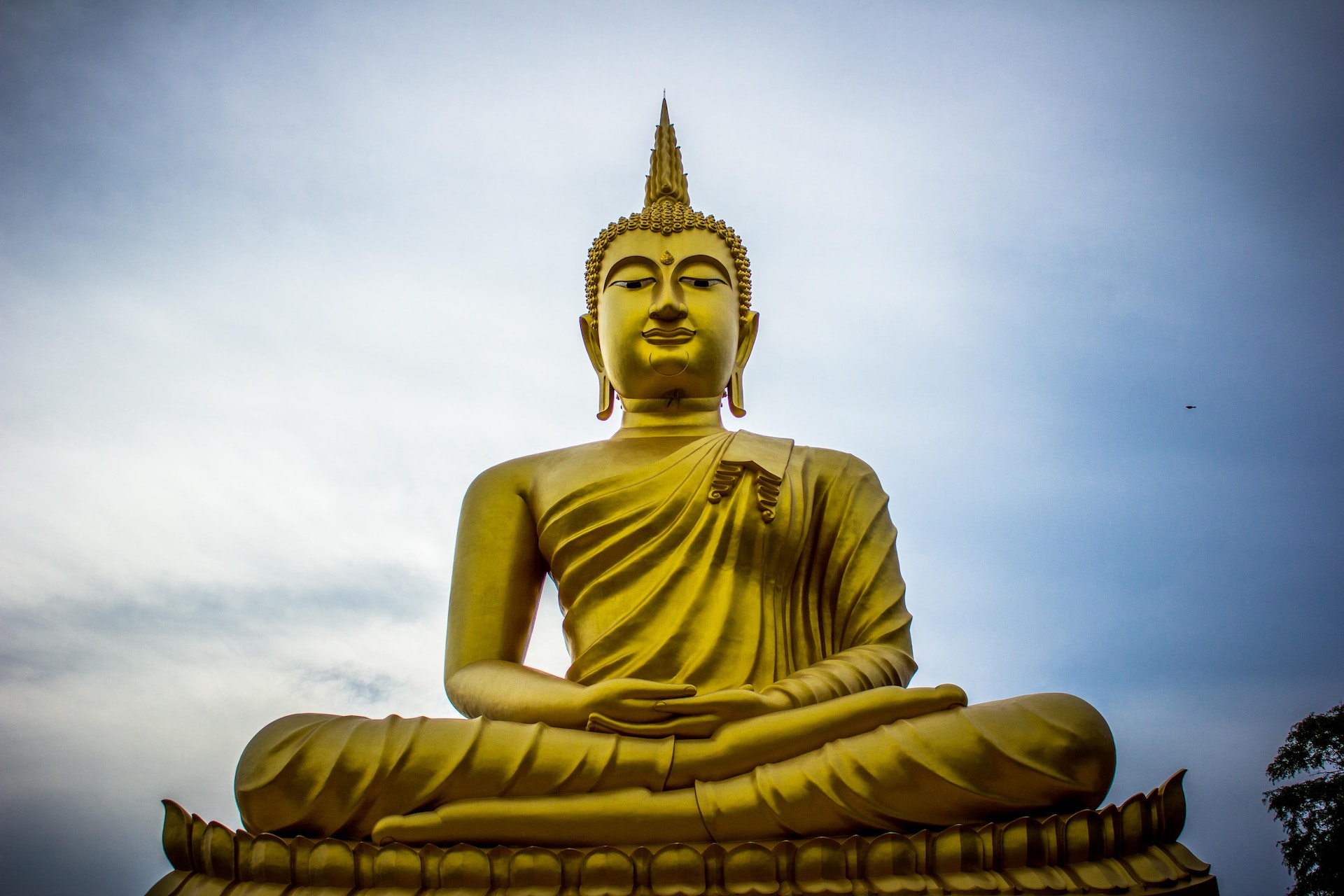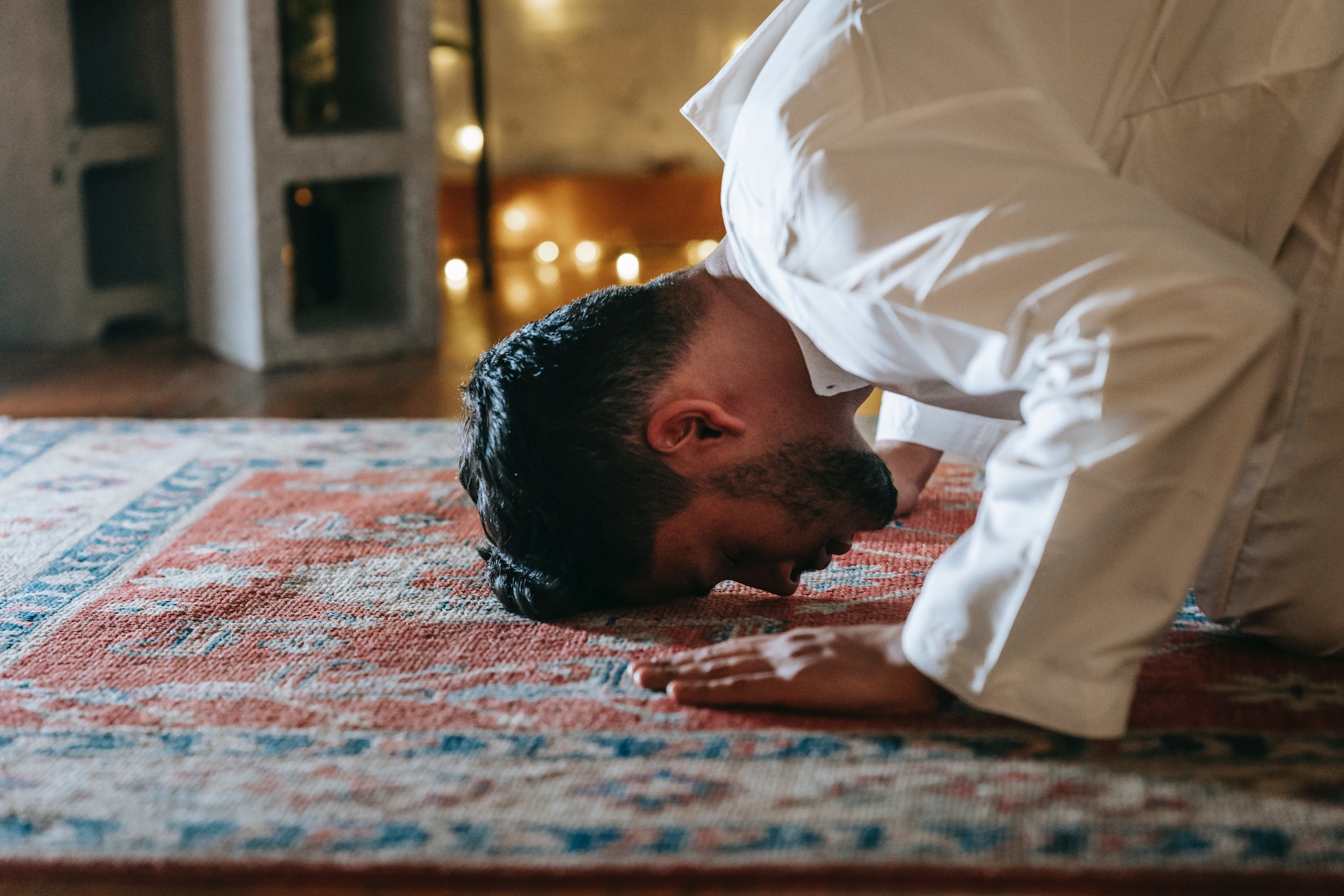Surrender is a complicated subject. On the one hand, it is perceived as negative — with connotations of defeat, loss and shame; yet on the other hand it is one of the greatest aspirations in any spiritual discipline. Even in the brief poem Desiderata, written in 1927 by Max Ehrmann, the word is used in both a negative and a positive sense. How does one reconcile these conflicting views?

Literally, surrender means to stop fighting, and yield to the control of another. Most people would agree that they could do without fighting, yet they are reluctant to yield control. Perhaps it all depends upon whom you are yielding to.
If you are yielding to a deranged and willful brute, of course surrender will feel like hopeless defeat. However, if you are yielding to a benevolent, omnipotent, higher power, surrender could feel like a profound relief — very peaceful and free from suffering.
Many people who have been revived from near-death experiences have described such a sensation, and everyone on a spiritual path strives toward this blissful state. One could say that spiritual surrender is the process of laying the ego to rest — as if it were dead.
Surrender and faith
Islam, the major world religion founded by the Prophet Mohammed, is also an Arabic term that translates directly as “surrender.” Muslims are called upon to surrender to the will of Allah, or God, submitting completely to the Divine will — a common thread among various spiritual beliefs.
Success
You are now signed up for our newsletter
Success
Check your email to complete sign up
Spiritual surrender is certainly a key concept in Christianity. As an act of faith, one is encouraged to trust in and surrender control to God and His perfect guidance. Proverbs 3:5-6 illustrate this principle:
“Trust in the LORD with all your heart and lean not on your own understanding;
in all your ways submit to him, and he will make your paths straight.”
Surrender is also at the heart of Judaism. Observant Jews regularly acknowledge their dependence on God, regardless of how much their own efforts shape their lives. Faith involves the surrender to the truth that God is in complete control of this world, so that one may “find peace and be delivered from our temporal fears.”
The key point in spiritual surrender is to recognize that we are ultimately not in control. By surrendering that role which our egos want to play, we are able to faithfully follow the Divine will.
Surrender to your true self
The concept of God can vary widely. Some religions worship only one specific God, while others believe in multiple Gods. Alternatively, many people understand the Creator to be a Divine force that is both omnipotent and omnipresent; that is, It is within everything and everyone.
Thus, surrendering to the Divine can also be understood as surrendering to the better, higher, knowing-side of oneself. When the selfish ego is set aside, or surrendered, our own profound, innate wisdom can come forth.

The Buddha school teaches that we all have both demon nature and Buddha nature. Surrendering your willful demon nature to follow your Buddha nature brings you closer to your true self and its Divine origin.
Yoga may be a popular way to relax and keep fit, but its roots are deeply spiritual. The term yoga is derived from a Sanskrit verb meaning “yoke” or “join,” suggesting a union with the Divine — a connection that is only possible through surrender. By quieting the mortal senses, one can reunite with his or her higher self.
Where surrender takes you
Thomas à Kempis, a German-Dutch Canon and Christian author of the 15th Century, wrote, “For immediately, as soon as thou givest thyself to God from thy whole heart, and seekest neither this nor that, according to thine own pleasure or will, but settlest thyself wholly in Him, thou shalt find thyself united and at peace; for nothing can afford so sweet a relish, nothing be so delightful, as the good pleasure of the Divine Will.”
By surrendering the ego and its fear of defeat, shame, and powerlessness, we enter a higher level of existence. Rising above ordinary human desires and attachments, we are liberated from the pain and anxiety of struggling for them, whereby we can focus on our more important spiritual goals.
Spiritual guide Jonathan Parker describes the surrendered state as a “dynamic stillness,” where one is suspended “in a consciousness level of infinite possibilities with a reassurance that everything will work out in a positive way.”
When we surrender the ego, we are able to charge through the barriers it has set for us. Rather than being confined by our adopted notions, we fall in line with the way of the universe, opening limitless doors to opportunity.
Because spiritual surrender does away with all resistance; as if a veil was lifted, we are able to see the value in both positive and negative experiences. Like a cheerful Arhat, one is no longer troubled by anything, and takes everything very lightly. Surrender thus facilitates spiritual growth, wisdom and enlightenment.
Giving in versus giving up
Perhaps the most difficult thing about surrender is that we don’t want to give anything up. We hold tightly to everything that is familiar and comfortable, including our stubborn notions. Yet a shift in mindset can make all the difference.
Spiritual surrender is not about giving up material things, lifestyles, or pursuits — although it’s good if we can take these things lightly; it is more about giving in — allowing things to come and go, people to be who they are, and events to take their course — without getting emotionally involved.
“Always say “yes” to the present moment. What could be more futile, more insane, than to create inner resistance to what already is? what could be more insane than to oppose life itself, which is now and always now? Surrender to what is. Say “yes” to life — and see how life suddenly starts working for you rather than against you.”
Eckhart Tolle
Giving in means accepting and appreciating what is, rather than struggling to achieve what isn’t. Of course, giving in does not mean that we relinquish all pursuits – they just become more noble.
We should always try our best to do what we believe is right. The key is to not be attached to the result. Humbly accept the responsibility, the path and the pain that has been arranged for you. Things will work out the way they will, and when we give in to this reality, we are surrendering to the Divine Will.
Attitudes of surrender
Surrender, as a state of mind, is closely connected with other positive mentalities — such as awareness, humility, faith and patience.
Awareness
Spiritual guides often speak of mindfulness, or living in the moment. Although mindfulness can help us in many ways, it is not necessarily a prerequisite for surrender; in fact, it can come as a consequence of it.
By surrendering to the Divine, you may become aware of and alert to things beyond yourself. Because you are not preoccupied with selfish concerns, you can experience being fully present in the moment and expand your consciousness to one of harmony with the universe.
Humility
Humility, on the other hand, is a prerequisite to surrender. Only when we acknowledge our weakness, our fallibility and our dependence on a higher wisdom will we be able to give our hearts fully to that unknown, yet omnipotent force. To cultivate humility, try to think of yourself as a small part of a greater whole, where everyone is an integral part of a supreme existence.
Faith
Many people equate faith with surrender, or at least believe that faith is necessary for surrender. To be sure, faith in a higher power, in yourself, or in the universe will make surrender easier, since you have a strong belief that some magnificent power has the ability to make things right. It may be possible, however, to work backwards in extreme circumstances.

Suppose you are at the end of your line — you have lost hope in life and simply cannot continue the struggle of striving for what you want. Completely lost and powerless, you give in to let the universe do what it will with you — only to find that everything changes from that moment on. Many people discover faith in their most trying ordeals. Is it because the Divine reveals Itself when we surrender unconditionally?
Patience
Surrender cannot be rushed. Just like everything in the universe unfolds at its natural pace, surrender is a process. As we continue on a spiritual path, accumulated wisdom will eventually reveal that surrender is not optional; but in the meantime we must be patient with ourselves and others.
Life is a work in progress, where we perfect ourselves through many trials and ordeals. If we don’t do well in certain regards, we mustn’t get discouraged. Chin up, and try to do better next time.
Acts of surrender
Physical acts of surrender show respect and reverence for the Divine; simultaneously negating the ego and reinforcing humility. Kneeling, prostration, prayer and meditation can all be effective tools in moving us toward surrender.

Kneeling
Kneeling is a demonstration of humility commonly practiced in religions — especially the various Christian churches. In genuflecting, one is both vulnerable and weak. Like subjects kneeling before their king in ancient times, the faithful acknowledge their Lord as “Master.” While this simple, submissive posture can help suppress the ego, many religions take it a step further.
Prostration
Prostration is practiced to varying degrees in numerous religious ceremonies. Islamic prayer, important Jewish holidays, Christian rituals, and Buddhist and Hindu worship all include prostration. Placing the body in a submissive, prone position — with the hands and/or head touching the ground — is a profound act of nullifying the ego — submitting to the Divine.
In ancient China, prostration was widely used to demonstrate reverence — be it to one’s elders, the Emperor, or the Divine. Often called ding li (頂禮 ), or “worship with the crown (of the head),” prostration can help one surrender selfish pride. Some Buddhists believe this can also help clear the mind.

Prayer
While praying for superficial things is not only useless, but also disrespectful; praying for guidance, wisdom and salvation is an act of reverence and surrender. Through daily communication with our higher power, we become increasingly aware of how well our behavior meets the Divine standard, and we are more inclined to discard, or surrender, our bad thoughts and actions.
Meditation
Through regular meditation, one exercises and enhances the capacity to surrender. The practice of observing our random thoughts without engaging them helps us differentiate between the ego and the true self. Random thoughts about what you need to do when you’re finished, what you should have said to someone, or whatever discomfort you’re feeling, all begin to seem petty and fade to the background when you dedicate this time to spiritual growth.
The tranquility that one finds so elusive can finally be achieved when one surrenders the ego completely, and assimilates with the Divine.
“To a mind that is still the whole universe surrenders.”
Lao Tzu













